Overview
In the world of software development, developers often encounter significant coding challenges that can impede progress. How can these hurdles be overcome effectively? Enter Kodezi, a powerful tool designed to automate various tasks, including bug detection, performance optimization, and documentation updates. By streamlining these processes, Kodezi allows developers to concentrate on more complex coding challenges.
The benefits of using Kodezi are substantial. Not only does it enhance code quality and efficiency, but it also significantly boosts overall productivity while reducing downtime. Imagine a scenario where tedious tasks are automated, freeing up valuable time for developers to innovate and solve intricate problems. Wouldn't that transform your coding practices?
Furthermore, Kodezi's features are tailored to address the most pressing pain points faced by developers today. Automation leads to fewer errors and quicker turnaround times, making it an invaluable asset in any developer's toolkit. In addition, the platform's user-friendly interface ensures that even those with mid-level expertise can harness its capabilities effectively.
Don't miss out on the opportunity to elevate your coding experience. Explore the tools available on Kodezi's platform and discover how automation can revolutionize your approach to software maintenance.
Introduction
In the rapidly evolving landscape of software development, developers often encounter significant challenges in maintaining code quality and efficiency. These hurdles can seem daunting, but innovative solutions are emerging. Kodezi offers a suite of AI-driven continuous development strategies that empower developers to automate and enhance their workflows. By leveraging these tools, teams can streamline software maintenance, reduce manual effort, and ultimately improve product reliability.
But how does Kodezi specifically address these challenges? With features designed to automate routine tasks, Kodezi allows developers to focus on higher-level problem-solving. This not only boosts productivity but also enhances code quality, as automated checks can catch errors that might slip through manual processes. As organizations increasingly adopt these advanced technologies, a crucial question arises: how can teams balance automation with the essential human oversight needed to ensure quality and accountability in their development processes?
Exploring the tools available on the Kodezi platform can provide valuable insights into achieving this balance. By integrating automation thoughtfully, developers can harness the power of AI while maintaining the critical human element that ensures the integrity of their work.
Kodezi | Professional OpenAPI Specification Generator - AI Dev-Tool: Automate Code Maintenance and Debugging
Developers often face significant challenges in maintaining code quality and troubleshooting issues. This is where Kodezi comes into play, functioning as a professional OpenAPI specification generator that automates various aspects of code upkeep. By integrating seamlessly with existing workflows, the CLI allows developers to focus on writing code while it independently enhances code quality and resolves issues before they reach production.
With features such as:
- Automatic bug detection and fixing
- Performance optimization
- Security compliance
Kodezi significantly reduces the time spent on manual debugging. Imagine being able to identify and address performance bottlenecks effortlessly. Furthermore, the tool's ability to generate OpenAPI 3.0 specifications ensures that documentation remains current, thereby enhancing collaboration among team members and improving overall code quality.
Why settle for less when you can elevate your development process? Studies indicate that automation can boost defect detection rates by up to 90%, ultimately accelerating development cycles and reducing time-to-market. By utilizing Kodezi, you not only preserve existing code quality but also promote ai continuous development for a more efficient development process. Explore how Kodezi CLI can transform your development workflow today!
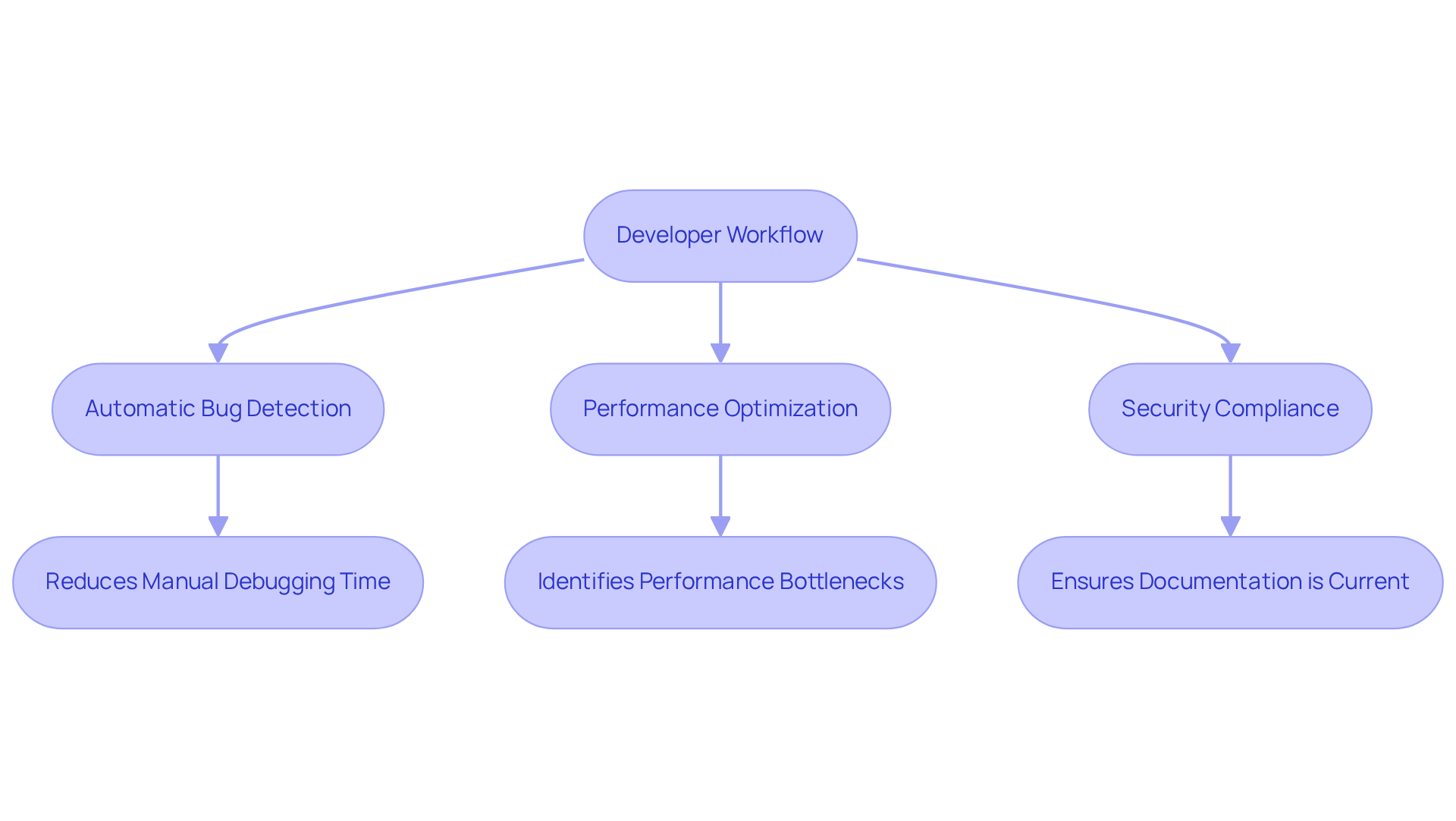
Harness.io: Streamline CI/CD with AI-Driven Automation
The challenges of Continuous Integration and Continuous Deployment (CI/CD) processes can be daunting for developers. Harness.io steps in to tackle these issues through AI-driven automation, significantly enhancing the efficiency of releases. By automating routine tasks such as build verification and deployment, it allows teams to launch applications more swiftly and with greater confidence. Furthermore, the platform offers real-time insights and analytics, enabling teams to identify bottlenecks and optimize their workflows effectively.
This approach not only boosts productivity but also mitigates the risk of post-deployment issues, ensuring that applications are delivered with improved reliability. Organizations that adopt CI/CD practices report an average time savings of up to 25% and experience 50% fewer failures. This underscores the transformative impact of automation in modern software development. As DevOps leaders emphasize, the AI continuous development of streamlined deployment processes is crucial for maintaining a competitive edge in today’s fast-paced digital landscape.
However, challenges such as legacy systems and infrastructure continue to pose significant hurdles for 29% of DevOps leaders. This highlights the necessity for robust solutions like Harness.io to navigate these complexities effectively.
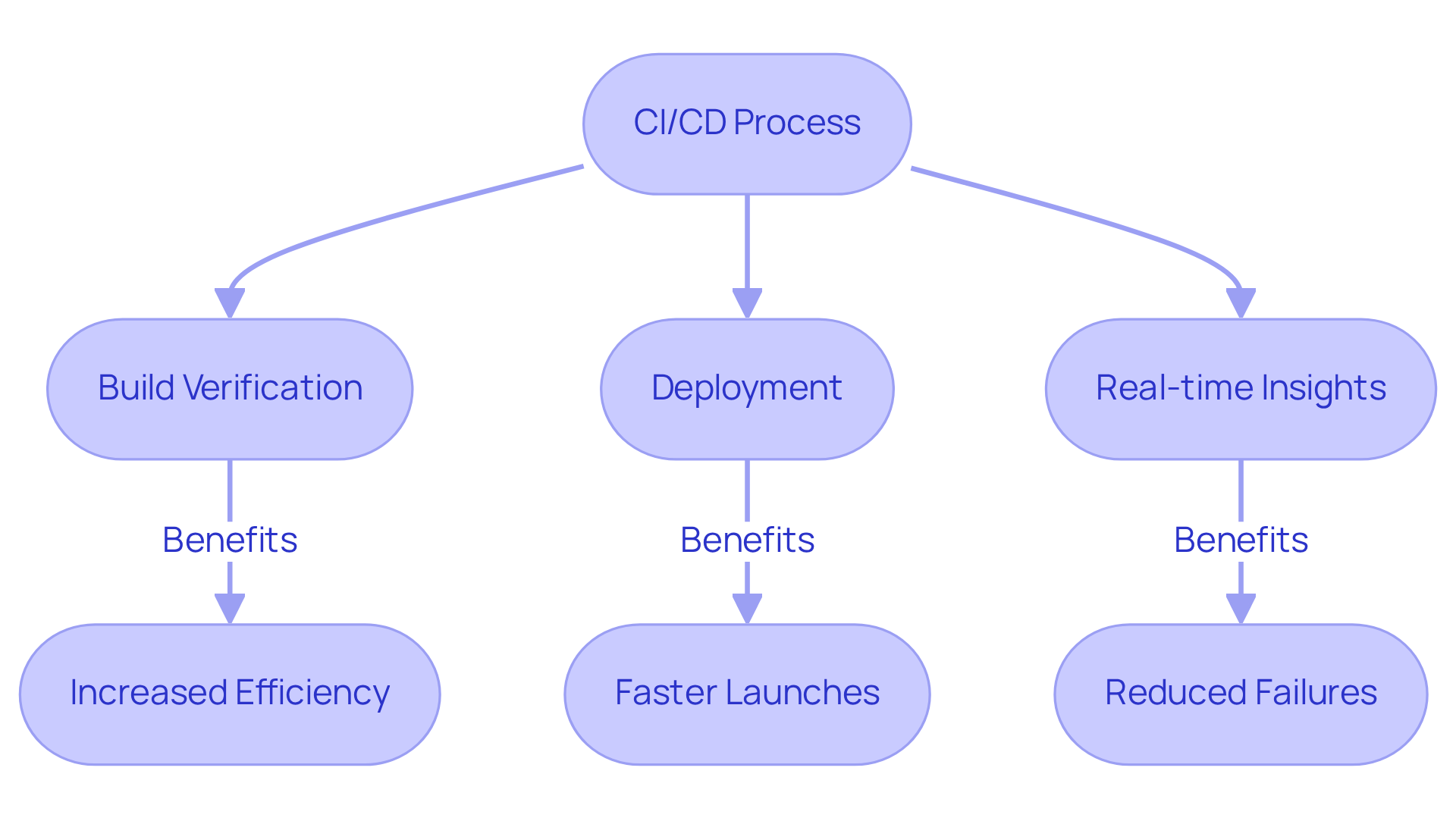
AI in DevOps: Enhance Monitoring and Anomaly Detection
AI continuous development is revolutionizing DevOps by significantly enhancing monitoring and anomaly detection capabilities. Developers often face challenges with identifying issues in their code before they escalate. How can these issues be addressed effectively? Through the process of AI continuous development, analyzing vast amounts of data in real-time allows for pinpointing unusual patterns that may signal potential problems early on. This proactive strategy allows teams to resolve issues swiftly, minimizing downtime and ensuring system reliability.
Furthermore, tools that support AI continuous development, such as Kodezi, not only learn from historical data to continually refine their detection algorithms but also provide actionable insights to DevOps teams. Imagine a programming tool that enhances productivity by automatically fixing code and examining bugs. This ensures that code quality is maintained throughout the development process.
In addition, the command-line interface (CLI) autonomously improves codebases and resolves issues before they reach production. This establishes it as an invaluable resource for engineering teams that prioritize efficiency. By leveraging these AI-driven tools, teams can enhance their workflows and contribute to AI continuous development while focusing on what truly matters: delivering high-quality software.
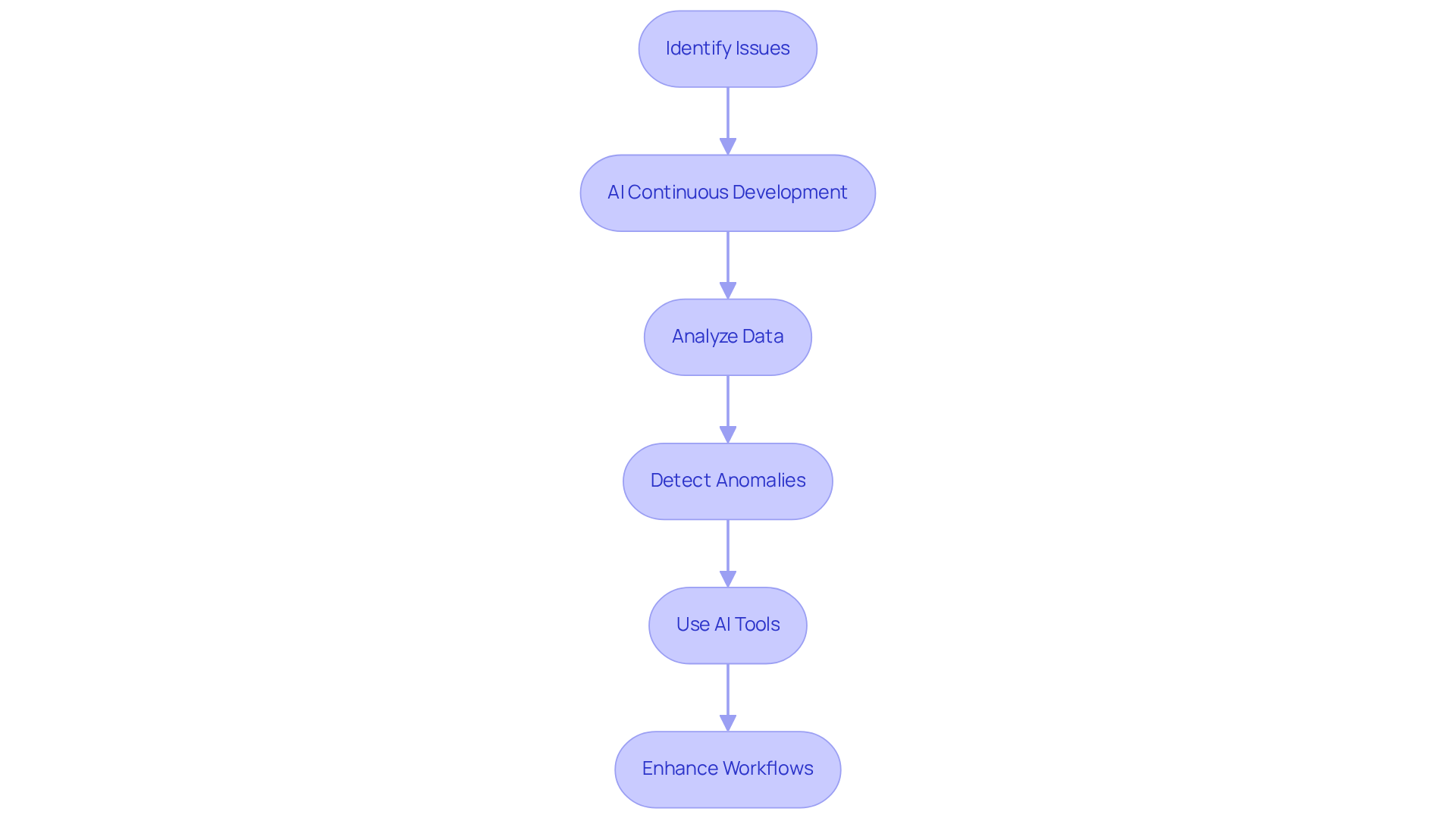
Continuous Learning AI: Adapt and Optimize Software Maintenance
Developers often face significant coding challenges that can hinder productivity and efficiency. AI continuous development in systems like the Kodezi CLI tool is specifically designed to address these issues by adjusting and improving maintenance processes over time. By meticulously analyzing user interactions and system performance, Kodezi CLI autonomously enhances codebases and resolves bugs before they reach production. This adaptability ensures that the program remains efficient and relevant, even as requirements shift.
Furthermore, AI continuous development within these systems promotes the incorporation of new technologies and approaches, ensuring that the maintenance process aligns with industry best practices. Recent advancements in AI continuous development, particularly through tools like the CLI, have demonstrated considerable enhancements in operational efficiency. Organizations have reported up to a 43% decrease in system downtime as a result of implementing these solutions.
In addition to improving maintenance efficiency, these AI systems enable teams to focus on higher-level tasks, ultimately fostering innovation and productivity in development. Imagine the potential for your projects when you can dedicate more time to creative problem-solving rather than routine maintenance.
For those eager to experience these benefits firsthand, a quick start is just a click away. Explore our 5-minute quickstart guide and see a demo to witness Kodezi CLI's capabilities in action.
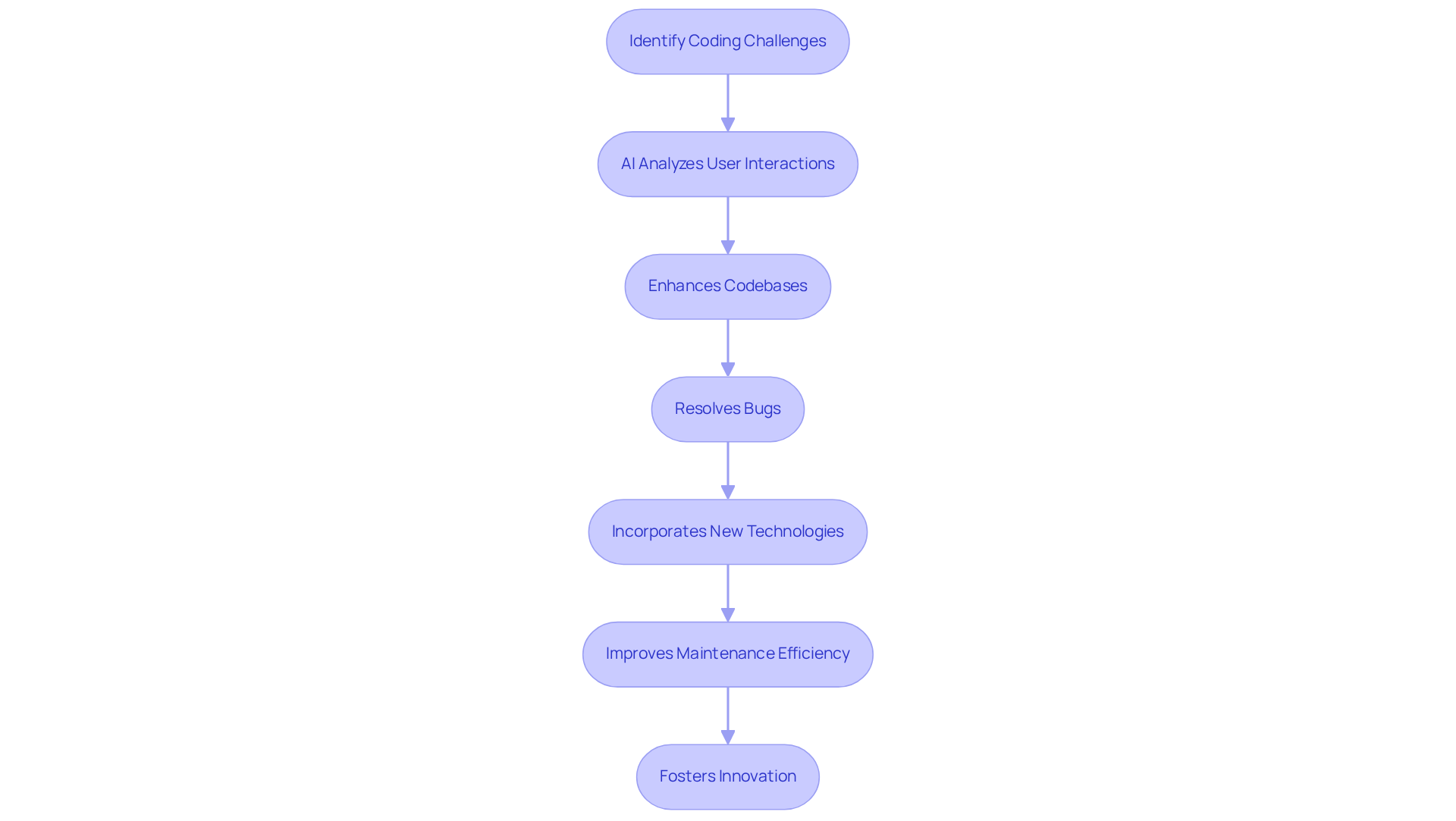
AI-Powered Automated Testing: Ensure Code Quality and Reliability
In the fast-paced world of software development, developers often grapple with the challenges of ensuring high code quality and reliability. AI-driven automated testing solutions are pivotal in addressing these issues. Kodezi stands out by autonomously generating and executing test cases while analyzing results, significantly reducing the manual effort typically required for testing.
Furthermore, Kodezi's CLI exemplifies this innovation by autonomously enhancing codebases and resolving issues before they reach production, making it an invaluable resource for B2B engineering teams. It also offers automated code generation from PDF instructions and features a user-friendly drag-and-drop functionality, further streamlining the development process.
But what does this mean for developers? By utilizing machine learning algorithms, Kodezi adapts testing strategies based on historical data, effectively pinpointing critical areas for testing and optimizing overall test coverage. This not only accelerates release cycles but also boosts confidence in application performance.
As organizations increasingly integrate AI into their quality assurance processes, the landscape of application testing continues to evolve through AI continuous development. This promises faster, more dependable delivery, making Kodezi a compelling choice for developers looking to enhance their productivity and code quality. Explore the tools available on the Kodezi platform and see how they can transform your development experience.
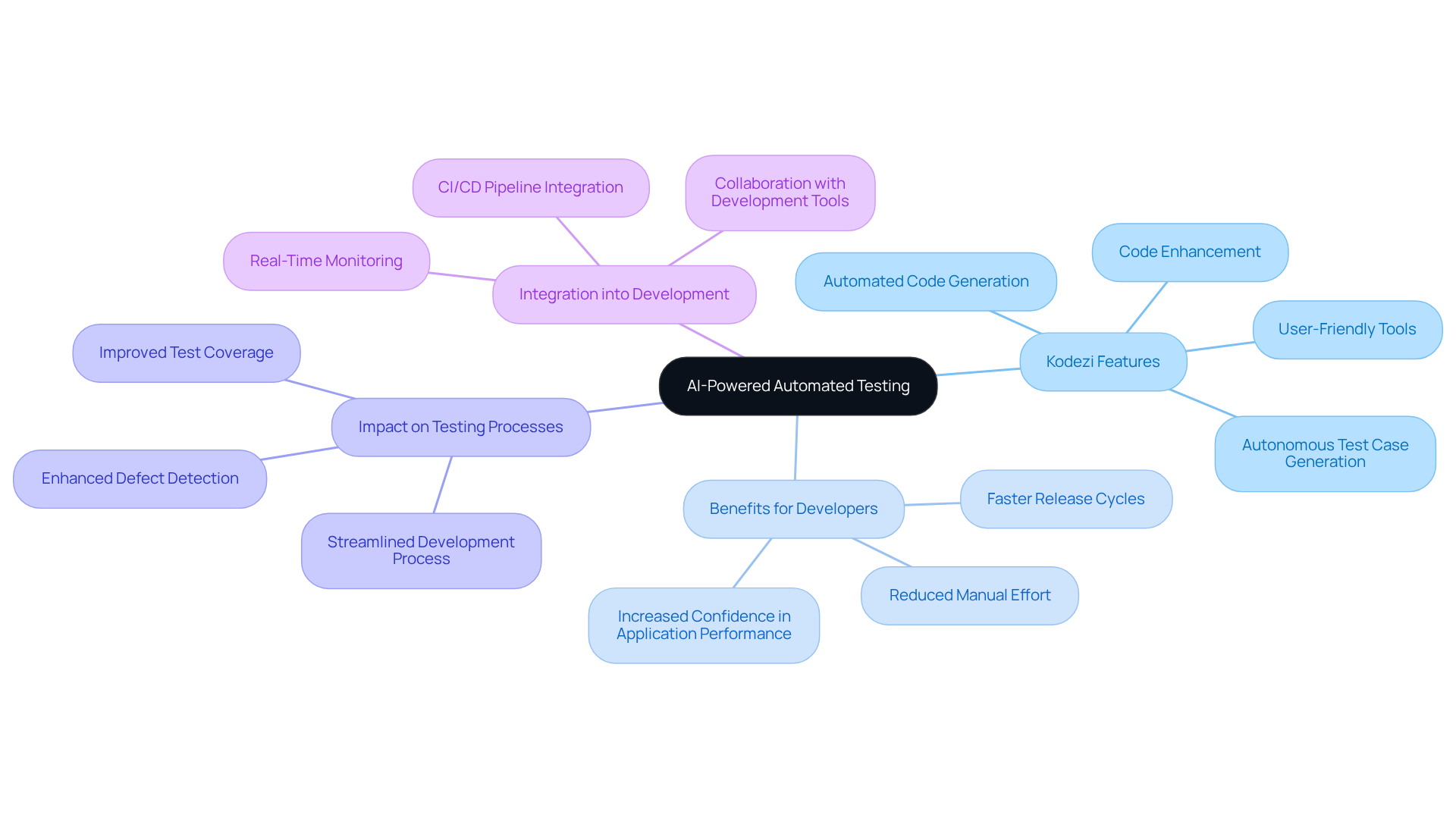
Predictive Analytics: Enhance Deployment Success with AI Insights
Predictive analytics plays a crucial role in today’s application deployments, utilizing AI to analyze historical data. This technology allows organizations to anticipate potential outcomes, which is essential in navigating the complexities of deployment.
By discerning patterns and trends, companies can proactively identify issues that may arise, enabling them to implement measures that effectively mitigate risks. This foresight significantly enhances the likelihood of successful deployments, as teams are better prepared to tackle expected challenges.
In fact, companies employing predictive modeling have reported a remarkable 40% increase in project success rates. Furthermore, predictive analytics optimizes resource allocation and scheduling, streamlining the deployment process and enhancing overall efficiency.
Organizations leveraging data-driven forecasts experience a 30% reduction in development time, underscoring the practical advantages of these insights.
Have you considered how predictive analytics could transform your deployment strategies?
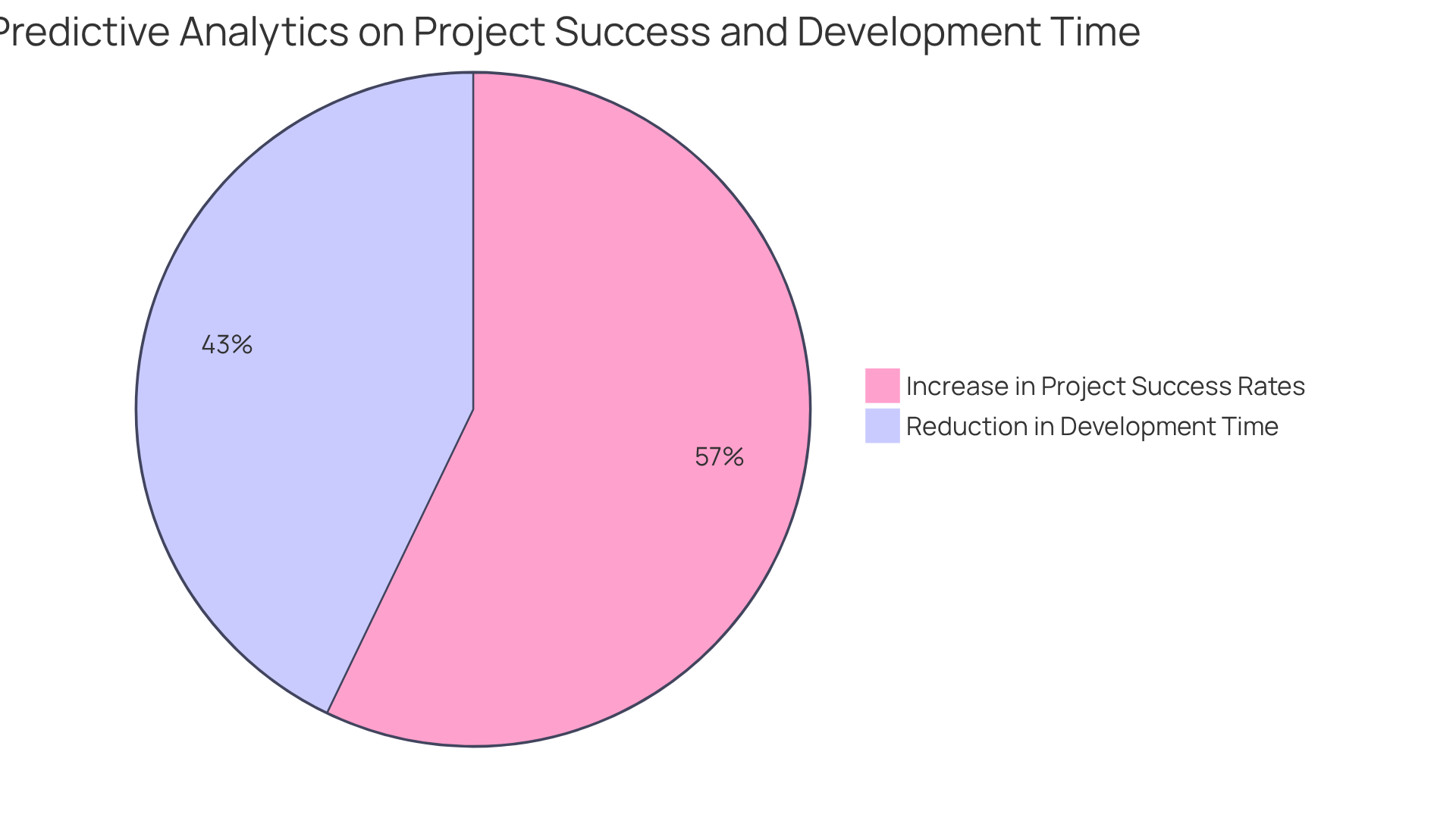
AI for Root Cause Analysis: Quickly Identify and Resolve Issues
Coding challenges are an inevitable part of software development. Developers often find themselves grappling with issues that can slow down progress and hinder productivity. AI-driven root cause analysis resources, such as Kodezi, are essential for AI continuous development, empowering teams to swiftly identify and resolve problems within their software systems. By meticulously analyzing logs, metrics, and historical data, Kodezi uncovers the underlying causes of issues, significantly reducing troubleshooting time. For instance, organizations utilizing AI for issue resolution have reported an average time reduction of up to 89%. This allows teams to focus on implementing solutions rather than getting bogged down in diagnostics.
Imagine a scenario where your team can enhance operational efficiency and bolster overall system reliability. Companies like Spotify and Moderna have successfully integrated AI continuous development into their workflows, which has streamlined processes and improved response times. Furthermore, Kodezi demonstrates how AI continuous development can independently manage codebases, integrating smoothly with platforms such as GitHub and CI/CD pipelines. Users have lauded the tool for its capability to assist them in discovering and resolving bugs more quickly and effortlessly than traditional techniques. One user even described it as a 'lifesaver' for rectifying problems.
The benefits of using Kodezi extend beyond mere troubleshooting. Another user characterized Kodezi as a resource that feels like a 'superpower' for debugging, greatly improving productivity and enabling teams to concentrate on more advanced tasks. With AI managing the heavy lifting of data analysis, engineering teams can prioritize proactive measures. This ensures that systems remain robust and responsive to emerging challenges. Are you ready to explore the tools available on the Kodezi platform and transform your coding practices?
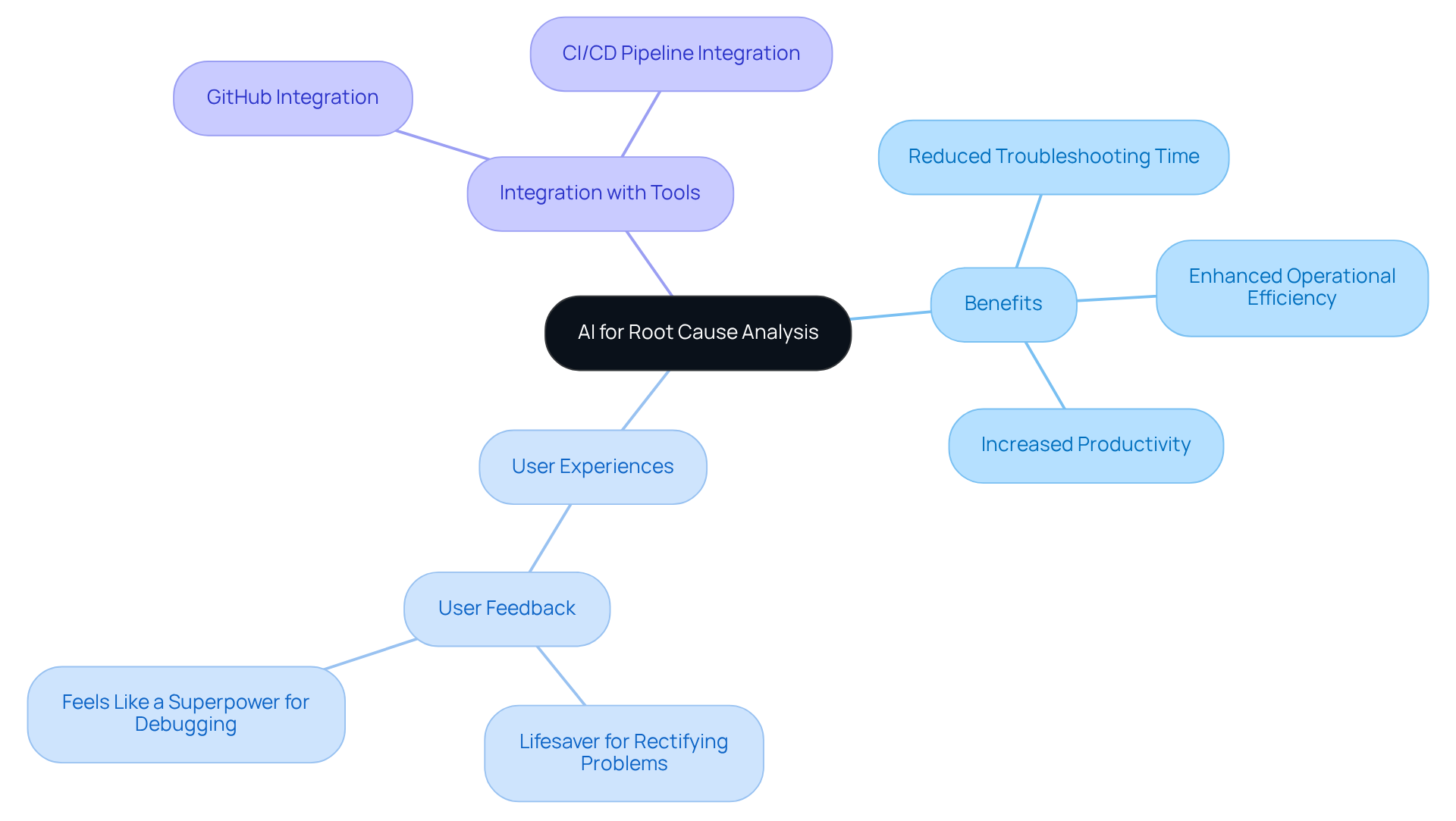
AI-Driven Documentation Updates: Keep Your Codebase Accurate
AI continuous development in documentation solutions is revolutionizing how developers manage documentation by addressing the significant challenges they face in maintaining accuracy and relevance. As codebases evolve through AI continuous development, ensuring that documentation reflects the current state of software is crucial for effective collaboration and knowledge transfer within teams. But how can developers keep up with these demands while focusing on coding? This is where Kodezi comes into play.
With its ability to automatically track changes in the codebase, Kodezi autonomously proposes or implements essential updates to existing documentation. This not only enhances the accuracy of documentation but also significantly boosts developer productivity. Organizations using AI tools for documentation have reported completing tasks up to 55% faster compared to traditional methods. Furthermore, the automation of code reviews and security enhancements streamlines the development process, allowing teams to work more efficiently.
Several companies are already harnessing the power of AI to automate their documentation processes. For instance, Kodezi OS automatically updates README files, changelogs, and inline documentation, ensuring that all documentation is in sync with the latest code changes. This capability, enabled by AI continuous development, reduces the risk of discrepancies that often arise from manual updates, effectively streamlining workflows.
Moreover, developers have expressed a strong preference for resources that support AI continuous development in documentation. Many report that these tools significantly enhance their ability to maintain precise documentation, enabling them to focus on more complex coding tasks. With the CLI tool, teams can auto-repair codebases and improve programming efficiency, ensuring that documentation remains relevant and accurate. To fully leverage the benefits of these tools, teams should consider integrating Kodezi into their workflows for a more efficient development process. Why not explore the tools available on the Kodezi platform and see how they can transform your documentation practices?
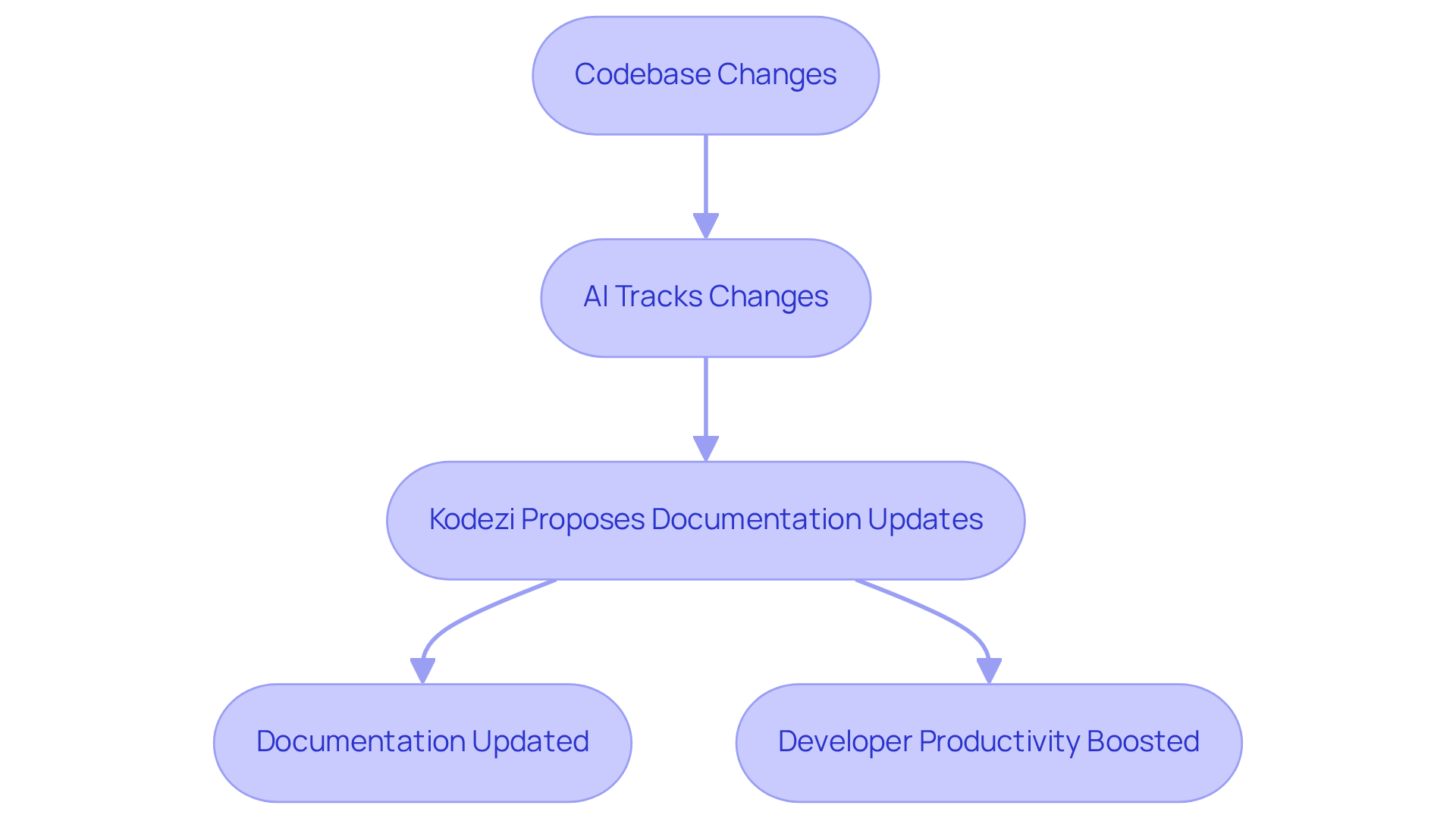
AI for Security Checks: Automate Vulnerability Detection
In the fast-paced world of software development, coding challenges are a common hurdle that developers face. AI technologies are fundamentally transforming security checks by automating the vulnerability detection process. Kodezi stands out in this landscape, enhancing code quality and fixing bugs before they reach production. This platform meticulously analyzes code for potential security flaws, ensuring that vulnerabilities are identified and remediated early in the development cycle.
Unlike competitors like Copilot, Kodezi functions as an autocorrect utility for code, concentrating on debugging and optimization instead of merely code completion. Furthermore, it supports over 30 programming languages and is currently compatible with Visual Studio Code, making it a versatile option for developers. By embedding security checks directly into the development pipeline, teams can adopt a proactive approach to security. This significantly mitigates the risk of breaches and bolsters the overall security posture of their applications.
The integration of Kodezi not only streamlines the development process but also supports AI continuous development by enhancing the efficiency of security operations. Organizations can respond swiftly to emerging threats, leading to a more robust security framework. As a result, companies utilizing AI for security checks observe a significant reduction in incidents. This reinforces the critical need for automated solutions in today's fast-paced AI continuous development environments. According to cybersecurity experts, the implementation of AI-driven security measures can reduce incident response time by up to 96%. Isn't it time to explore how Kodezi can elevate your coding practices?
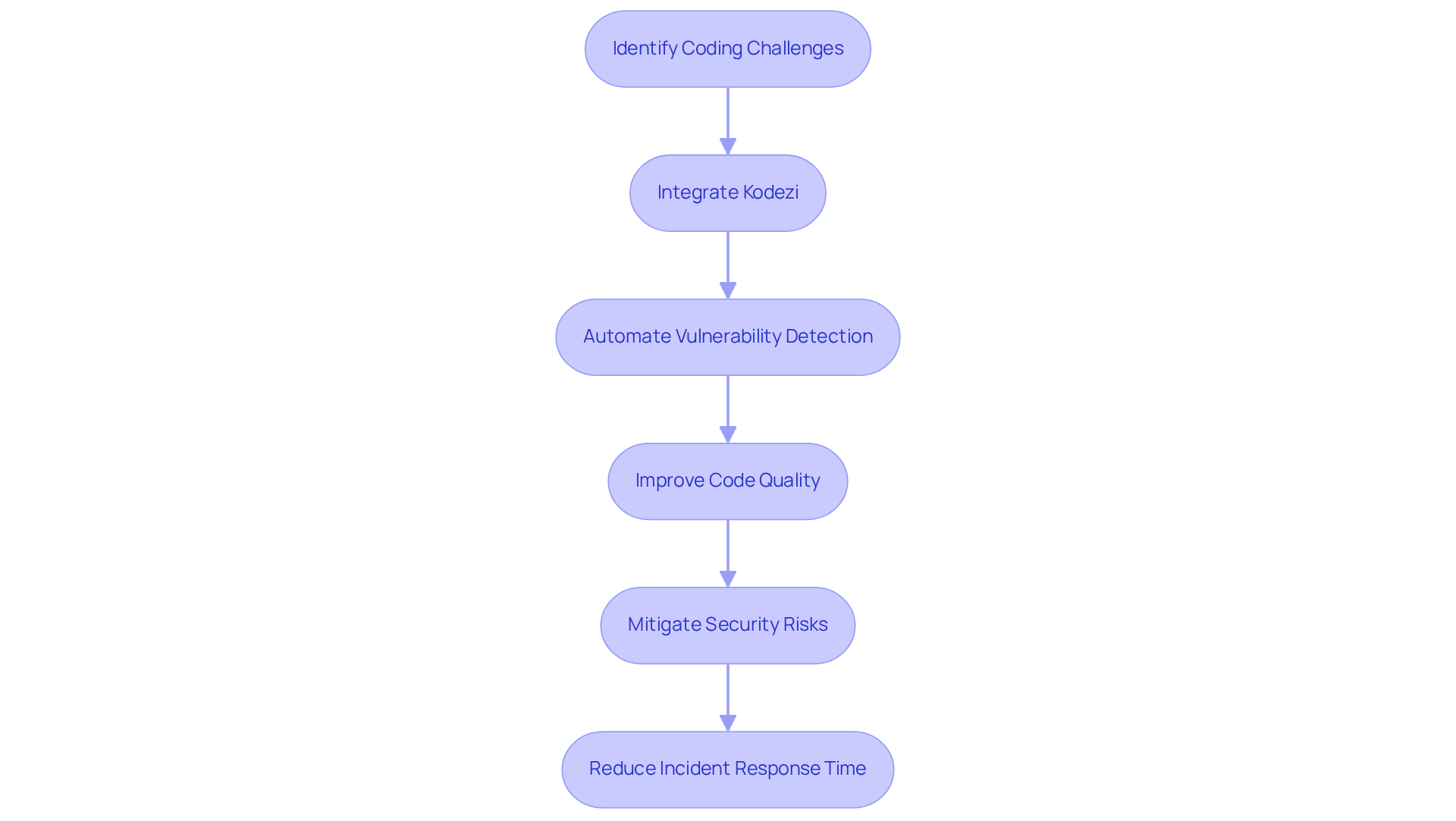
Human Oversight in AI: Ensure Quality and Accountability in Maintenance
In the realm of software development, coding challenges are a common hurdle that developers face. While AI systems provide significant advantages in automating software maintenance, the necessity of human oversight ensures quality and accountability. Human operators are essential in validating AI decisions, monitoring performance, and addressing ethical concerns that may arise. Kodezi steps in to assist programmers by identifying and resolving bugs more swiftly and conveniently than traditional methods, demonstrating its invaluable role in rectifying issues.
Furthermore, the platform's regular updates and responsiveness to feedback enhance its user-friendly features, as noted by users like Pradeep from the Indian Institute of Technology Delhi. This responsiveness fosters a sense of empowerment among developers, allowing them to feel more productive with tools like Kodezi. By striking a balance between AI automation and human intervention, organizations can leverage AI continuous development to harness the strengths of both for optimal results in software maintenance.
Have you considered how integrating such tools can elevate your coding practices? The benefits of using Kodezi include improved productivity and enhanced code quality, making it a compelling choice for developers looking to streamline their workflow. Explore the tools available on the platform to experience these advantages firsthand.
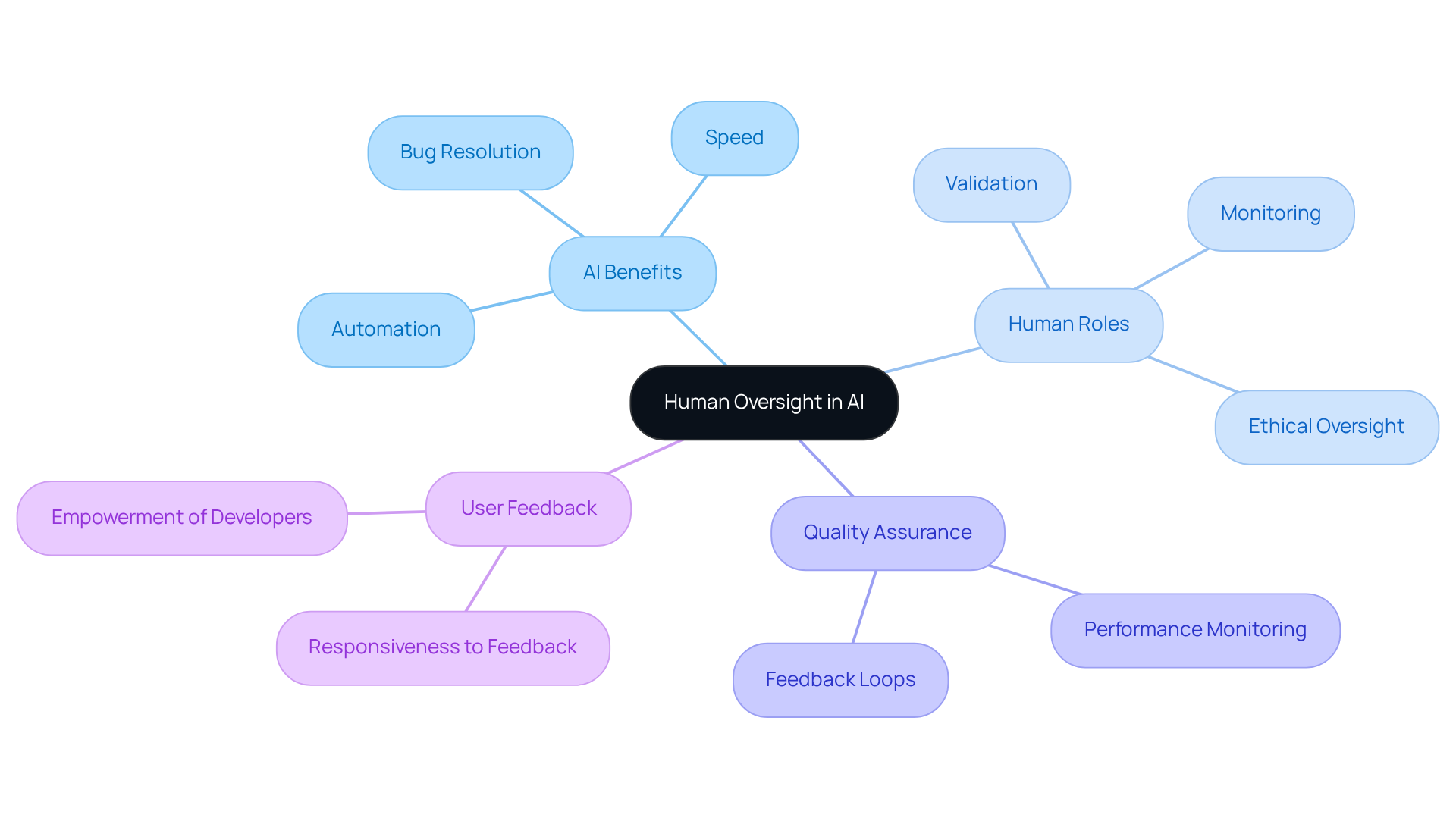
Conclusion
Incorporating AI into software maintenance processes is now a necessity for developers striving for efficiency and high-quality outcomes. The strategies discussed here emphasize the transformative power of AI continuous development, illustrating how tools like Kodezi and Harness.io streamline workflows, enhance code quality, and optimize deployment processes. By leveraging these advanced technologies, organizations can maintain and elevate their software development practices.
The discussion highlights several key strategies, including:
- Automated bug detection
- AI-driven CI/CD processes
- Enhanced monitoring
- The importance of human oversight
Each element plays a critical role in ensuring that software maintenance is proactive rather than reactive, allowing teams to focus on innovation rather than being bogged down by routine tasks. Moreover, the integration of predictive analytics and automated testing underscores the efficiency gains achievable through AI.
Ultimately, adopting AI continuous development strategies is essential for organizations looking to remain competitive in the fast-evolving tech landscape. By embracing these tools and practices, teams can improve operational efficiency and foster a culture of continuous learning and adaptation. It is time to explore how integrating AI into software maintenance can transform development processes, enhance collaboration, and drive success in future projects.
Frequently Asked Questions
What is Kodezi and how does it help developers?
Kodezi is a professional OpenAPI specification generator that automates various aspects of code maintenance, allowing developers to focus on writing code while it enhances code quality and resolves issues before they reach production.
What features does Kodezi offer?
Kodezi offers features such as automatic bug detection and fixing, performance optimization, and security compliance, significantly reducing the time spent on manual debugging.
How does Kodezi improve code documentation?
Kodezi generates OpenAPI 3.0 specifications, ensuring that documentation remains current, which enhances collaboration among team members and improves overall code quality.
What are the benefits of using Kodezi for development?
Using Kodezi can boost defect detection rates by up to 90%, accelerate development cycles, and reduce time-to-market while preserving existing code quality and promoting continuous development.
What challenges do developers face in CI/CD processes?
Developers often face challenges such as lengthy release cycles and post-deployment issues, which can hinder the efficiency of Continuous Integration and Continuous Deployment (CI/CD) processes.
How does Harness.io address CI/CD challenges?
Harness.io uses AI-driven automation to streamline CI/CD processes by automating routine tasks like build verification and deployment, enabling teams to launch applications more swiftly and confidently.
What are the reported benefits of using Harness.io?
Organizations that adopt CI/CD practices with Harness.io report an average time savings of up to 25% and experience 50% fewer failures, indicating significant improvements in productivity and reliability.
What role does AI play in enhancing monitoring and anomaly detection in DevOps?
AI enhances monitoring and anomaly detection by analyzing vast amounts of data in real-time, allowing teams to identify unusual patterns early and resolve issues swiftly, minimizing downtime.
How do AI-driven tools like Kodezi contribute to DevOps?
AI-driven tools like Kodezi learn from historical data to refine detection algorithms, provide actionable insights, and autonomously improve codebases, thereby enhancing productivity and maintaining code quality.
Why is AI continuous development important in software development?
AI continuous development is crucial for maintaining a competitive edge in fast-paced digital landscapes, as it allows teams to focus on delivering high-quality software while streamlining their workflows.




